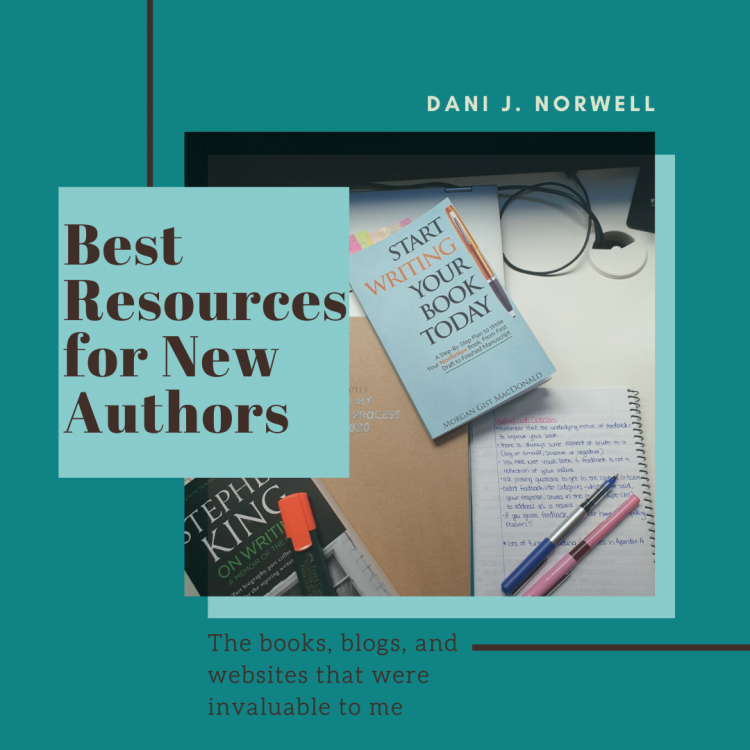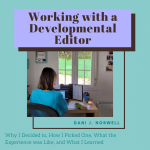The Resources That Were Invaluable to Me
When I first embarked on the journey of self-publishing, I knew very little about the process. There are so many things to consider that I never even thought of before beginning my research and, for that reason, I wanted to put together this list of resources that were so useful for me as a first-timer.
Of course, there are many different kinds of resources—books, blogs, podcasts, videos—and so each person should choose the media that works best for them. Personally, I relied most on books and blogs, with a few videos and podcasts sprinkled in along the way. I hear social media can be a great place to connect and learn as well, but it’s not something I personally did. Here’s what worked for me…
Books to Read Before (and During) Writing:
1.) Start Writing Your Book Today by Morgan Gist MacDonald: Although this is perhaps the book on the craft of writing that I reference the least, it was the first book I read on the topic and I think it was a very good place to start! With just 105 pages of main text (there are examples and further resources after that) you can easily read it in just one or two days. It’s pragmatic and concise. I believe the speed with which I was able to work through this book greatly influenced the momentum I had going forward.
2.) On Writing: A Memoir of the Craft by Stephen King: This was definitely the book I enjoyed and feel I learned the most from. However, as the title implies, it is just as much a memoir as it is a guidebook for writers. As someone who respects and enjoys Stephen King’s writing, this was very interesting but I can understand that it might not feel that way for everyone. One thing I did not expect, but greatly appreciated, from On Writing was the breadth of recommendations King made about other books on the craft and other authors he recommends in general.
3.) The War of Art by Steven Pressfield: Speaking of which, this book was one of King’s recommendations and I’m so glad I followed up on it! The War of Art was somewhat of a combination of #1 and #2 on this list—a much quicker, easy-to-digest read but with more personal insights than Start Writing Your Book Today. Before reading this book, I had never quite considered myself an artist but, based on Pressfield’s definition it is now a standard I strive to hold myself to.
4.) Big Magic by Elizabeth Gilbert: I feel slightly disingenuous including this title because, at the time of writing this list, I have actually not yet finished Big Magic. However, from the very beginning I could tell it was a resource I would resonate with. The style is more similar to that of King’s in the way that Gilbert references her own work and personal experiences. It’s much more abstract and “woo woo” than #1-3 but I enjoy that kind of thing and am loving her definition of “Big Magic.” I think it is something that every creative writer should believe in.
Blogs to Read Before Publishing Your Book:
I’d like to add the note that there are dozens, if not hundreds, of solid blogs out there on writing and self-publishing. I’ve visited a lot of them for one topic or another but there are two that I was able to turn to for information on almost every topic I had questions on. For this reason, I think these are the big two that all new writers should start with.
1.) Kindlepreneur: Dave Chesson has been self-publishing on Kindle for years—long before it became the “way to go”—so he really knows a thing or two about the process. His website and YouTube channel are both highly curated and chock-full of useful resources. I could (and did!) spend weeks on end following and reading through all the links to further resources from his videos and/or blog posts and never have to leave his site. In addition to all of the vital free content he provides on self-publishing he also offers some paid services and tools, such as the Amazon Publisher Rocket.
And that’s not all—Dave also hosts a podcast! I had to cut myself off somewhere, so I chose to only listen to a handful of his episodes. However, from that brief experience I could tell that there was a lot of knowledge to be gained there as well. Personally, I’m someone who likes to take notes on what I’m trying to learn so this wasn’t an effective way for me to engage with his content as I tend to listen to podcasts while cooking, exercising, etc. However, it might be a great resource for you.
Additionally, I appreciated the many ways in which Kindlepreneur directs you to other authoritative resources, such as this list of writing podcasts he put together and this list of book bloggers to help you get reviews.
2.) Reedsy: This website feels like the ultimate writer’s landing page. They also have an endless list of curated videos and blog posts (I’m personally really drawn to Sheylen’s videos, even though she talks a mile a minute, because you can get half an hour’s worth of content out of a three minute video). In addition to those invaluable resources—that I also spent weeks working through—Reedsy offers unique opportunities.
They have weekly writing contests that can help you meet your writing goals, get your work out into the world in a less intimidating way, and potentially score you a $50 prize every time! Additionally, they run Reedsy Discovery, which is a branch of the website where writers can submit their work for a small fee ($50) for the chance to get reviewed (if one of their 700+ reviewers choose to pick up the book) and get featured on their page on the day of their book launch.
Finally, they have Reedsy Marketplace where you can connect and work with professionals such as editors, design artists, marketing specialists, etc (for a fee, of course). I didn’t personally choose to hire any professionals this time around but I trust Reedsy and so would definitely browse their database first when looking for professionals in the future. They also have tons of free tools and additional resources for the writer on a budget.
Style Guides to Read and Reference Often:
I read some of these resources before and during my writing process but it wasn’t until I began heavily editing my work that I realized their true value. I recommend you invest in having these books on your shelf and/or these blogs in your bookmarks for easy access.
1.) The Penguin Writer’s Manual by Martin Manser and Stephen Curtis: When it comes to style guides everyone references and recommends The Elements of Style. I get it and I believe in that resource’s value as well. However, after reading every single page of this 316-page manual (yeah, I know, I’m a weirdo), I believe The Penguin Writer’s Manual is just so much more thorough!
The writers are both English and so their style leans towards the British way of doing things. Still, they are sure to make note of where and how style deviates in the American structure, something I don’t see American style guides paying any attention to. As someone who reads and hopes to write for an international audience I believe it is important to learn about more than just the American approach.
2.) Elements of Style by William Strunk Jr.: I know you will find recommendations for this one everywhere so I won’t bother to go into much explanation. It’s a thin and concise manual that every writer should have handy. All the same, keep in mind that it was written in 1920 and, while there seem to be some updated editions available, the resource is still primarily based on that time period. For this reason, even though it is the quintessential writing guide, I personally turn elsewhere when making decision about my writing in the modern day.
3.) Quick and Dirty Tips (Grammar Girl) website: My eleventh grade English teacher would play us an episode of the Grammar Girl podcast every Friday and, trust me, I used to roll my eyes like the rest of the class at her lame attempt to make grammar seem cool. However, this year I’ve found myself biting my tongue as I’ve turned to this section of the Quick and Dirty Tips website time and time again. They simply have the answer to most any grammatical and/or vocabulary question that pops up and the way in which the topic is explained is always thorough, yet concise, and digestible.
4.) The Write Stuff blog: Diane is a writer and editor who runs this blog on writing and grammar. Although it doesn’t seem to have been updated since 2014, her posts still rank highly in Google searches of almost any grammar question I’ve had so I trust her advice and would recommend her blog regardless. (Although I made the point about The Elements of Style being outdated, I don’t believe six years has changed much in terms of grammar). I like to reference both #3 and #4 to confirm they are in agreement and that I am not making grammar choices on one person’s opinion.
Well, I could go on and on with further resources that I’ve used but these are the ones that have had the most lasting impact on me or that I have returned to countless times. I believe if you start out with these, you will be well-prepared for the road to success!
Do you have other resources that have been invaluable to your writing process? If so, please share them below, I’d love to check new ones out, too!


Thanks so much for these links and recommendations. I will use them when I get around to writing my own book!